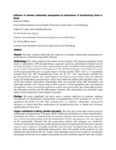Influence of customer relationship management on performance of manufacturing firms in Kenya

View/
Date
2021-06Author
Rajab, Fatuma Ali
Ngugi, Patrick Karanja
Kiarie, David Mburu
Metadata
Show full item recordAbstract
Purpose: The study sought to determine the influence of customer relationship management on performance of manufacturing firms in Kenya.
Methodology: This study employed descriptive research design. The targeted population of this study is comprised of 499 manufacturing companies which are all located in Nairobi and its environs. In order to come up with a representative sample, stratified random sampling method was used since the population is heterogeneous. The stratified technique ensured that each sector in the target population has an equal chance of being selected. There were 217 respondents sampled from the 499 manufacturing firms out of 217 ,180 respondents returned the questionnaires for analysis. The study adopted a descriptive survey design. Data was collected using self-administered questionnaires which were tested for validity and reliability using 10% of the total sample respondents. Quantitative data was analyzed using both descriptive and inferential statistics and with the help of SPSS version 23 while qualitative data was analyzed descriptively. Linear and multiple regression models were used to show the relationship between the dependent variable and the independent variables. The information was presented using tables, charts, frequencies, percentages and graphs.
Findings: The study established that there exists a positive influence of customer relations management on performance management of manufacturing firms in Kenya at 5% level of significant (β=0.595, P<0.05). This indicates that as customer relationship management increases to certain level then performance of manufacturing firms in Kenya also increases significantly and vice-versa
Unique contribution to theory, practice and policy: The study has proved that indeed customer relationship management as a strategic alliance influences performance in these organizations. In addition, the study is of benefit to the government of Kenya who should create awareness of their policies through training of the key stakeholders for this organizations since the majority of the respondents indicated that the government policies and strategies are ineffective. Customer relationship management had significant effect on organization performance and this requires that to improve on quality production and lead time, manufacturing firms must also improve their customer relationship management. Since the quality of the products has not significantly improved for the last 5 years, more strategies must be put in place to incorporate technology which will aid to improve the quality and also maintain required lead time in these organizations. Other researches and scholars may want to build on this study and explore other areas of interest that were not covered in this work
